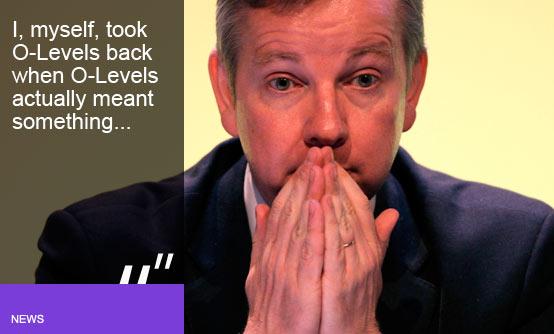So I've finally caught up on what I missed from having a week away (turns out it takes over two weeks to catch up - conference season probably hindered that even though I'm not there) and the main story I wanted to comment on is that of the Gove-Levels, where GCSE's are to be replaced by an 'English Baccalaureate Certificate'.

Education is always, like healthcare, going to be a touchy subject. It's hard to change it without a backlash, even if your changes are good people will always be sceptical This is probably harder still when it seems that your solution is to jump into a Delorean and drag the countries kids with you.
I tried to go into reading about it with an open mind, but the more I read the less I liked.
One potentially good reform is that of only having a single examination board. When I was doing GCSE's I was confused by the 3 different boards that we used for different subjects. It seemed very much like a race to the bottom where we'd just gone for the ones which appeared to give the best chance of higher grades. Without having to compete for schools a singular board shouldn't feel the need to continually lower their standards as so many have been accused of doing in the past. I would have the exam board working closely with Universities as they are a key stakeholder in the examination system and need to trust the outcomes.
I've tried looking for other aspects for things that might be positive, however I just don't see them:
- Reducing coursework and modules puts everything into an all or nothing exam, with added pressure and luck. In this situation it is all about how you do on one day and that is basically supposed to assess what you have learned over your whole life of schooling. What if you're ill? What if you have hay fever? What if you're a 15 year old girl and it's your time of the month... What if you've got all three? Is that really going to be a fair assessment of your ability? This is also as far as possible detached from real life, where most jobs have constant deadlines and work goals which is reflected by coursework. Also, this leads to a greater opportunity for a student to coast throughout the year and just put a big effort into a cramming session at the end of the year. Modules and constant assessment require students to apply themselves all year round.
- Grading on a curve - limiting the highest grade (Grade 1) to 10% of the entrants makes it impossible to compare standards year on year. If the difficulty level is set correctly and consistently then improving teaching standards will not see an improvement in results and will hamper later students as they'd need to be brighter than previously to obtain the same grade as before.
- If the one exam is to genuinely be one exam for all then I struggle to see how it would genuinely stretch the brightest and simultaneously not leave many behind. There has been a lot of talk about "returning to a two tier system", well that's what GCSE's were, except in Maths where there were THREE tiers. This was to give each student the best chance of achieving their goal, as with the lower papers you could still achieve a Grade C, which is seen by many as the minimum good grade to have achieved, whilst reducing the chance of failing, which was possible by taking the higher paper. I know that I was always left frustrated in classrooms when I hadn't been segregated by ability (I don't want to sound cocky or arrogant but I won my school's Maths prize at the end of Year 11 and was in the top set for everything, even English where I didn't feel confident). I found my higher level GCSE Maths papers too easy as they were (I finished the non-calculator paper in about 40 minutes, it was a 2 hour exam), if I'd had to take the same paper as those in the lower tier it would have frankly been a waste of my time answering the easier question - or it would completely turn some other students off when they look at questions that they genuinely aren't able to do.
- There's no reason that they can't just adjust GCSE's to act the way that they want, if Michael Gove's qualifications really will be more rigorous then great, but why can't GCSE's just be adapted to match the desired difficulty and challenging aspects. Is there any actual indication that this wont just turn into an even bigger memory test?
I think the key is, what do we want our education to be for, what is the main goal. Is it to teach our children to pass exams, to prepare them for life at work, give them life skills or to provide them with a good, well rounded education, even if they end up using very few of these skills. Perhaps I would be more enthused if Mr Gove stopped focusing on the way we obtain results and more about the quality of them. If the curriculum is good and the method of assessment allows students to apply what they have learned (not just what they have memorised), where the teachers teach rather than coach students to pass exams and the children come out of school with skills that will set them up for later life, then surely this is all that matters. I fail to see how preparing for one make or break exam would allow all students to achieve what they are capable of.


